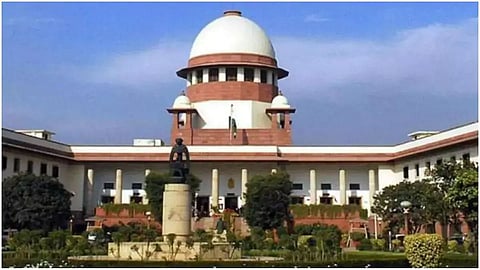
- Home
- Live Blog
- Breaking News
- Top Headlines
- Cities
- NE News
- Sentinel Media
- Sports
- Education
- Jobs

NEW DELHI: The Supreme Court has restored the citizenship of Md Rahim Ali, a Muslim man hailing from Assam who was mistakenly declared a foreigner 12 years ago by a Foreigners Tribunal.
The Court found a "grave miscarriage of justice" in the case, pointing out severe procedural faults.
The case began in 2004, when a sub-inspector from Nalbari police station visited Rahim Ali's residence, stating that he was a foreigner and asking for proof of Indian nationality.
Despite Rahim Ali's subsequent efforts, including a temporary delay to obtain essential documentation, the tribunal proceeded ex parte in 2006, declaring him an illegal Bangladeshi migrant post-March 25, 1971.
According to reports, Rahim was unable to appear in court due to illness; however, the tribunal determined that he "had failed to discharge his burden" under Section 9 of the Foreigners Act by failing to prove that he is not a foreigner.
A panel of Justices Vikram Nath and Ahsanuddin Amanullah ruled in Rahim Ali's favor, emphasizing severe faults in the 2004 legal procedure launched by the police that resulted in his wrongful classification as a foreigner.
The Supreme Court emphasized that, even though the evidence does not yet need to be evaluated for its full evidentiary value, any accusations must be supported by more than just a reasonable doubt.
“In the absence of basic/primary material, it cannot be left to the untrammelled or arbitrary discretion of the authorities to initiate proceedings, which have life-altering and very serious consequences for the person, based on hearsay or bald and vague allegation(s),” the Court stated.
The SC criticized the authorities for misinterpreting the term “main grounds” for “allegations” at the initial stage of the proceedings.
This misinterpretation was found sufficient to invalidate the entire procedure.
The Court clarified that "main grounds" differ from the "allegation" of being a foreigner.
“Audi alteram partem does not merely envisage a fair and reasonable opportunity of being heard. In our opinion, it would encompass within itself the obligation to share material collected with the person/accused concerned,” the judgment stated.
The Court stated that the evidence provided to the tribunal was disregarded due to errors in the English spelling of names and dates.
The bench stated that slight spelling discrepancies should not result in serious consequences, considering that variant spellings are frequent throughout India due to regional pronunciation patterns.
“It is not uncommon throughout India that different spellings may be written in the regional/vernacular language and in English. Such/same person will have a differently spelt name in English and the local language. This is more pronounced where due to specific pronunciation habits or styles there can be different spellings for the same name,” the Court further stated.
The Supreme Court overturned both the Gauhati High Court and the Foreigners Tribunal's rulings, proclaiming Ali an Indian citizen clearly.
“We are not inclined to remand the matter to the Tribunal for another round of consideration. Putting an authoritative quietus to the issue, the appellant is declared an Indian citizen and not a foreigner. Necessary consequences in law shall follow,” the judgment concluded.
ALSO READ: Pakistani migrants awarded Indian citizenship in Jaipur after years
ALSO WATCH: